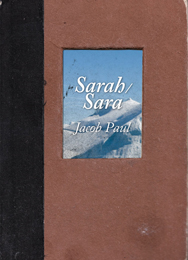Review: SARAH/SARA by Jacob Paul

Review by RACHEL ADAMS
At a cozy brewpub in Salt Lake City, Utah, I share a pitcher of beer with author Jacob Paul. He has just handed me an advance copy of his new book, Sarah/Sara, and the discussion turns to a subject familiar to both of us: the adherence to and departure from organized religion. I approach the topic somewhat wearily—this conversation has become a ritual in itself for apostolic types here in Utah—but our talk is no chorus of agreement, no recitation of wrongs. Paul offers no easy outs for the nonbeliever; he refuses to dismiss the desires of the faithful offhand. His questions are probing; his thoughtful take on faith upsets my default position.
Sarah/Sara is likewise unwilling to let the skeptic off the hook. The language of faith and the language of skepticism, seemingly untranslatable one to the other, rub up against one another, melt at the edges, blur in their respective intents. By the end of the novel, even the most hardened doubter, even the most fervent believer must look hard to see the line in the sand, must examine her own feet to rediscover where she stands.
Sara, the protagonist and narrator of the novel, was born Sarah, the child of secular Jewish parents who live in New York. Unsatisfied with their worldview, which seems to promise a life of shallow, pointless pursuits, she seeks deeper meaning among the faithful in Israel—to her parents’ dismay. Her mother dislikes being called Eema, Hebrew for mother; bristles at the doctrines she espouses (for example, that the victims of the Holocaust, or ‘Shoah,’ somehow deserved their fate). Sara, who has always had a difficult relationship with her mother, addresses the majority of her searching monologues to her father, who (unlike his wife) tried always to accept her choices, though he questioned her for embracing a culture which relegated her to “second-class status” and worried daily about her safety in a country full of suicide bombers.
The novel opens with a language we immediately recognize: the vocabulary of September 11th. It begins with her father’s survival of one attack by the fanatical faithful—and his death soon after in a similar attack, this time in a restaurant in Israel. These powerful images, once invoked, do not stand idly by, but join the central pull of the questions that Sara, as survivor, must ask of herself, of God, of the world.
Sarah/Sara is a story of consecration—Sara’s attempt to find her father by undertaking the dangerous journey that he always dreamed and spoke of taking, a kayak trip across the Arctic Ocean. It is about survival—the physical, mental, and spiritual struggle to stay in this world and to make something of the stay. It is a story about solitude and community—the things Sara must face about herself, the desire for the Other, be it Hashem, parents, a lover, or a woman on a bus hiding a bomb underneath baggy clothes.
Though Paul’s novel places us in foreign, harsh environments, from the physical (the Arctic, Israel) to the linguistic and ideological (Orthodox Judaism, with its da’avens and tznios), it never abandons us there—the reader must never feel like an outsider because the boundaries are fluid, they shift, they complicate. It is a rare novel that creates new space within its pages; that moves towards a new language and thus, a new understanding of the world. Paul’s debut novel creates just such a space—a space as beautiful, as subtle, as dangerous as the Arctic landscape through which it moves.